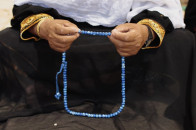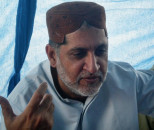Water-borne illnesses debilitate children
The presence of pathogenic bacteria was confirmed in water samples collected from multiple areas in the city

Despite the World Health Organization (WHO) identifying the provision of clean drinking water as a fundamental human right, till this day, locals in Pakistan’s industrial hub, Karachi, continue to suffer the perilous health repercussions of consuming contaminated water.
From February to April this year, the Health Department of Sindh obtained more than 50 water samples from different districts of the city before testing them at the Karachi Water and Sewerage Board (KWSB’s) laboratory.
The results of the tests confirmed the presence of several contaminants including pathogenic bacteria like Vibrio cholerae, E. coli and total coliforms, all of which have culminated into the recent diarrhoea outbreak, which has affected children below five the worst.
Noreen, a mother from Kemari, shared that her 3-year-old son developed diarrhoea after drinking water from the tap. “Upon visiting the nearest hospital, I was startled to find the emergency room overcrowded with countless other children like my son, who too were in a similar condition,” said Noreen.
Concurring with Noreen, Saeed, a father from Lyari, revealed that his infant daughter had also acquired diarrhoea due to water contamination in his area. “The water flowing in pipes across Lyari is contaminated with impurities, as a result, diarrhoea has become very common among children these days,” claimed Saeed.
“Nowadays, the diarrhoea epidemic is rampantly spreading among citizens, especially children and the primary culprit is the consumption of contaminated food and water,” revealed Dr Khalid Shafi, a paediatrician.
Dr Shafi’s observation was bolstered by data obtained by the Express Tribune from the Health Department of Sindh, which indicated that at least 20,000 cases of diarrhoea have been reported among children alone across three major government hospitals in the city in between April to September out of which the majority involved children below the age five.
The outbreak, which claimed the lives of two innocent children in the Musa Colony, appears to be concentrated in areas like Lyari, Nanak Wara, Ranchore Line, Old Karachi, Garden, Usmanabad, Saddar, Kharadar, Sher Shah Village, Baldia Town, Manghopir, Kemari and Machhar Colony, where locals predominantly rely on boring water for meeting their daily needs.
Additional statistics obtained by the Express Tribune divulged that at least 2,000 children were reported with diarrhea each month in the National Institute of Child Health (NICH) Hospital, while 750 others were reported each month in the emergency of the Civil Hospital and almost 800 more presented the same complaint to doctors at the out-patient department of the Lyari General Hospital.
According to Mohsin Raza, General Secretary of the People’s Labour Union, water-borne diseases like diarrhoea are spreading in Karachi due to the criminal negligence of officials at the KWSB, who fail to ensure the proper purification of water.
“The KWSB has 9 filter plants, out of which only three are in a working condition while the remaining six have been useless for many years. Furthermore, the chlorine that is added to the water for its purification is 40 per cent less than the ideal amount,” said Raza.
Raza’s revelations are alarming in a country like Pakistan, where, as per reports from the WHO, 60 per cent of child morbidity is already attributed to water-borne illnesses like diarrhoea, which afflict almost 6.4 million children annually. Although children under the age bracket of five constitute just around 15 per cent of Pakistan's populace, their mortality rate from diarrhoea is the highest in Asia.
“Diarrhoea is typically caused by a bacterial or viral infection in the intestines, which can lead to loose and watery stools lasting one to seven days. In children, this can be significantly harmful since the rapid water and electrolyte loss leads to dehydration,” said Dr Aftab Hussain, a medical expert.
“Therefore, people must seek immediate medical consultation if they or their child experience diarrhoea. Oral Rehydration Solution (ORS) is the first line of treatment since it replenishes the body’s salt balance, preventing fatigue and dizziness.
In more severe cases, hospitalization might be recommended since diarrhoea can also be fatal,” said Dr Wahid Rajput, Director at the Infectious Diseases Hospital.
In this regard, officials from the Health Department of Sindh maintained that public hospitals in the province were handling all diarrhoea cases to the best of their ability.
On the other hand, Intikhab Rajput, Chief Engineer at KWSB, rejected the impression that the required amount of chlorine was not being mixed in the water.
“Some filtration plants were damaged, and their repair work is underway. Other filtration plants are working just fine,” he claimed.



















COMMENTS
Comments are moderated and generally will be posted if they are on-topic and not abusive.
For more information, please see our Comments FAQ